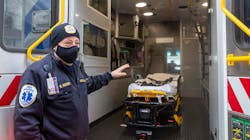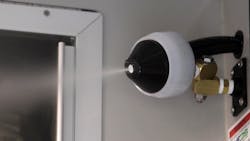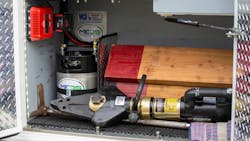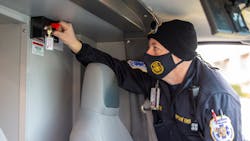New System Cleans NJ Ambulances of COVID in Minutes
Editor's note: Find Firehouse.com's complete coverage of the COVID-19 pandemic here.
NEPTUNE, NJ—Minutes—and even seconds—can make a difference in a medical emergency. But the global pandemic has first aid services across the globe trying to figure out how to balance disinfecting for COVID-19 and quickly returning ambulances back to service.
Neptune thinks it solved the problem after they became the first town in the country to equip its fleet with a system that drastically cuts down the time it takes to sanitize ambulances after calls for COVID-19 and other infectious diseases.
MEDS, short for Modular Electrostatic Disinfectant System, is a spraying system that mounts inside an ambulance, allowing the crew to disinfect the rear of the ambulance — where patients lie as rescue workers care for them as they go to the hospital — with the turn of a key and the flip of a switch from the cab.
Electrostatic systems charge the ions in the cleaning solution, which results in the droplets repelling each other and wrapping around surfaces being disinfected. That allows sanitizers to hit all areas of the ambulance even if the surface is, say, the underside of a stretcher.
In all, MEDS takes under two minutes to disinfect the ambulance, significantly cutting the downtime that had been required to sanitize their equipment.
MEDS was created by Bayonne-based Frontline Innovations and its owner, Mike McCabe. McCabe's family has owned McCabe Ambulance, also in Bayonne, for 48 years.
McCabe said his family's ambulance company had been using an electrostatic disinfectant sprayer to clean in between COVID-19 calls during the initial surge last spring. But that meant downtime for an ambulance while it returned to the station for cleaning.
"We are always thinking of easier and better ways to do things," he said. "(The electrostatic sprayer) became so every day to us that we thought this shouldn’t be hard."
Once COVID-19 calls calmed down, McCabe began looking for a system that mounts inside the ambulance permanently and realized there was none. He reached out to MaxCharge, the Georgia-based company where it bought its electrostatic sprayers. The two partnered to create Frontline Innovations and develop the MEDS system.
McCabe said he has gotten interest from EMS companies across New Jersey, the United States and as far away as Brazil and Saudi Arabia.
Neptune recently completed installing the system in its six ambulances, which cost about $45,000 in total. While McCabe has MEDS in his ambulances, he considers Neptune to be the first town to deploy the system.
Neptune already had a handheld electrostatic disinfectant sprayer for six years, however it was not built in to the ambulance, EMS manager Bil Rosen said. Instead, crews used it as a part of its regular sanitization protocol, he said.
When the COVID-19 pandemic struck, Neptune purchased more hand-held sprayers and used them after any call with a confirmed or suspected case of the illness or other infectious diseases. Crews would call the township's hazmat team to suit up and spray the ambulance down with disinfectant solution.
While the principle of MEDS is similar to handheld systems, calling in the equipment meant an ambulance could be out of service for anywhere from 15 minutes to an hour, Rosen said.
Neptune runs about 5,000 EMS calls a year, or roughly about a dozen calls a day, Rosen said. The out-of-service time to required to call in the hazmat team for disinfections means potentially three of those daily calls may have to be diverted to neighboring towns' EMS crews.
While patients who call for help will have someone respond, it may take longer for a crew from Asbury Park, Ocean Township, Tinton Falls or Wall to arrive in Neptune if the township's ambulance is out of service for cleaning, Rosen said.
MEDS means that ambulance could be sanitized and ready for the next call while its still at the hospital, dropping of its last patient, Rosen said.
The extra benefit, however, is easing the minds of the EMS crews, both paid staffers and volunteers, who are setting aside concerns of their own health to help the community in need.
Rosen said the system reduces the potential that crews will be exposed to COVID-19 or other infectious diseases like influenza or MRSA while disinfecting the ambulance or after dropping off an infected patient.
"Our crews are much more comfortable and satisfied that their ambulances are being disinfected not only quickly but completely," he said.
___
(c)2021 the Asbury Park Press (Neptune, N.J.)
Visit the Asbury Park Press (Neptune, N.J.) at www.app.com
Distributed by Tribune Content Agency, LLC.



